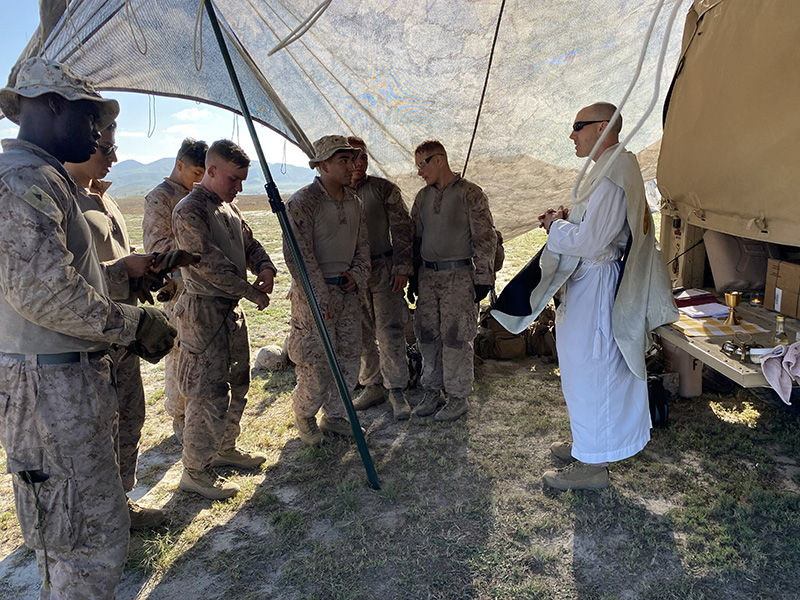
Fr. Samuel Schneider, a miliary chaplain with the Navy and priest of the Diocese of Superior, talks with Marines after celebrating Mass on the back of a truck. While only half of the Marines in attendance were Catholic, Fr. Schneider feels privileged as a priest to be the “chaplain for all.” (Submitted photo)
Jenny Snarski
Catholic Herald Staff
Fr. Samuel Schneider, whose family is from Rhinelander, was ordained a priest in June 2017. He was co-sponsored by the Diocese of Superior and the Archdiocese for the Military Services.
Although he joined the Navy and attended the U.S. Naval Academy before he transferred to the University of St. Thomas in St. Paul and St. John Vianney College Seminary, Fr. Schneider said his priestly call definitely comes before his call to serve in the military. That said, he sees how God uses a person’s gifts and interests integrated with the living out of their vocation.
After serving Navy sailors and their families on the naval base neat Tokyo, Fr. Schneider was assigned to Camp Pendleton in California, between Los Angeles and San Diego, last May. In an interview with the Catholic Herald, the priest shared how different his current assignment is. In Japan, he was more of a parish priest on base, and at Camp Pendleton, he is attached as chaplain to a battalion of about 500 Marines.
At the time of the interview, Fr. Schneider was preparing for a two-month training assignment in the desert east of the base – an experience that would have its share of physical challenges but one that would also offer an opportunity to share in the difficulties alongside the Marines.
“Living with them and experiencing with them helps really connect” his ministry and military presence, he said. Whereas on base, at the end of a day everyone goes back to their barracks, warm showers and hot meals, being alongside the men and women during this training exercise will be a time of deeper “incarnational ministry.”
“If I’m not there, I can’t be ‘there,’” he said referring to how his mentorship can take on different meaning when he’s sharing in daily struggles.
He has found great joy in being able to visit during shorter trainings and offer Mass and the sacraments. Bringing God’s love, nearness and sacramental grace to the Marines, wherever they are, is an example of how God doesn’t meet us only when we seek him out in church buildings, he affirmed.
Fr. Schneider spoke at length about the important role a military chaplain plays.
“It’s an important aspect of the military’s support” of their enlisted, Fr. Schneider said. He sees it as an acknowledgement of religious practice as beneficial for people. Clarifying that the military isn’t trying to establish any particular religious practice but does protect the ability to practice it, seeing it as an important element for the overall success and effectiveness of military forces.
“From an economic and psychological perspective, chaplains are invaluable,” Fr. Schneider noted. For sailors and Marines, many of them young and not used to dealing with the stressors, responsibilities and discipline, chaplains are “a resource” that keep behaviors stable and a unit cohesive.
There is, Fr. Schneider said, “a significant decrease in destructive behavior, suicidal thoughts and suicide” through the work of chaplains. Citing a statistic that even going to Mass once a month reduces mental health problems by 20 percent, the priest said, “the military knows that,” and supports their work, even though the government stands firmly behind the separation of church and state.
“The military knows that someone with a spiritual life is a more resilient warfighter,” he continued. Especially working now with Marines, “they don’t give the impression that it’s going to be easy. They acknowledge it’s gonna suck,” he said. While that taps into a natural human drive to accomplish difficult things, Fr. Schneider said one of the biggest challenges for the men and women is to go through the rigor of their training without being deployed.
When they can’t see up close why they’re training, it takes more intentional efforts to transcend their current circumstances and believe in the bigger purpose of needing to be ready to help protect the country whenever it might be needed.
Drawing a parallel with the spiritual life, he advised, “Keep in mind practice of spiritual disciplines is for the purpose of our eternal salvation and salvation of souls.”
Fr. Schneider concluded offering thanks for the prayers and support he continues to receive from the Diocese of Superior. For anyone wanting to reach out, his mailing address is: Fr. Samuel Schneider, 310 Sunset Way, Unit 6, Oceanside, CA 92058.
